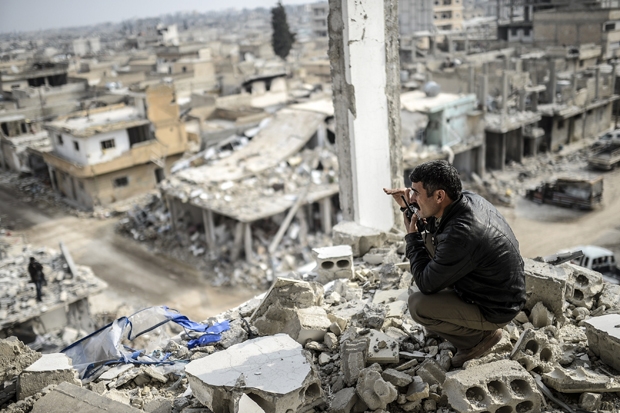Could radio, and in particular a weekly soap, have a role to play in the Syrian crisis? You might think, no chance, given the levels of violence and terror that have overtaken the country. How can a mere broadcast signal have an impact compared with all that destruction? But, says the director of Radio Alwan, a station operated by Syrians living in exile in a western suburb of Istanbul, ‘radio is effective’. It’s a ‘weapon’ because it ‘allows you to enter the houses of people and talk to them’. It’s also so easy. ‘You don’t need power, you don’t need electricity — just two small batteries.’
He was talking to Sara Davies on Between the Ears (Radio 3, Saturday), but we cannot be told his name for fear of reprisals. All of those working on the station have had to leave Syria after criticising the regime of President Assad. What Radio Alwan has given them is the chance to do something, even though they are no longer in Syria. The station, which transmits to Syria on FM but can also be found online, has become very popular because it’s the place to go to find out what’s happening. From Istanbul, they are constantly in touch by mobile phone with people in towns all across Syria and can report from inside the country on what’s really going on.
But the station is also about hope, and is determined to show that Syrians are ‘good people’. We heard lots of laughter from inside the office, singing too, and from the team of both male and female presenters. Meanwhile the director of the weekly drama serial, Sad Northern Nights, hopes it will change minds. It is deliberately targeted at women and tells the story of a mother and her teenage son who is caught up in the fighting. We want people to stop and think, says the director. To think that ‘although we hate the regime that doesn’t mean we love Daesh’.
The dream of everyone at Alwan is to move the station back to Damascus, to go back home. As Sara Davies says, their passion for radio, their enthusiasm and determination to continue, is inspiring and humbling: ‘It’s taken me right back to why I wanted to work in radio,’ to appreciating radio’s immediacy and the power of the human voice.
Over on Radio 4, Professor Michael Sandel (the philosopher who gave such a brilliantly clear and accessible series of Reith Lectures in 2009 on what it means to be a citizen) conducted an extraordinary experiment for The Global Philosopher (produced by David Edmonds). In conjunction with Harvard Business School, he walked into a ‘virtual’ lecture hall, surrounded not by an audience but instead by 60 video screens hosting each of the participants from 30 different countries. Sandel’s job was to mastermind a conversation between them, focusing on Tuesday on immigration by asking the question: should national borders matter, and, if so, why?
It took a while for this ‘global’ conversation to warm up as Sandel brought in one speaker, then another, each very obviously not present in the room with him but connected digitally. That vital sense of eye meeting eye was not palpable on air, which meant the programme lacked a dynamic quality, that compulsion to keep on listening. There was a lack of interaction, of ideas taking shape. But Sandel conducted his participants like a master puppeteer, bringing in Abdul from Oman (‘Why [should you deny entry]? As long as he doesn’t put the country at risk. He’ll bring economic benefits…’), then Simon from Plymouth (‘What’s the difference between dying from guns and dying from starvation? Our moral duty is the same’), so that by the time Leo started speaking from Brazil I was hooked. It turned out that he had spent three months in a detention centre in the UK as an illegal immigrant before being sent back to Brazil. Yet he was quite philosophical about it, telling us, ‘In spite of all that happened to me, European countries do have the right to take action against economic migrants… I was aware of what I was doing and I knew it was wrong. I took my chance and it didn’t work out for me.’
In Heart and Soul on the World Service on Sunday, Jane Little interviewed the American writer and essayist Marilynne Robinson. If you’ve not read any of her novels (especially Housekeeping and Gilead) you have a treat in store. I’m not sure I quite understand why she’s President Obama’s favourite writer because that implies an interest in power, authority, the big scheme of things, none of which you will find in her books. Instead she transforms the everyday by investing it with sacredness. On meeting Obama, who interviewed her for the New York Review of Books, she says, ‘He is the profoundest soul I have ever known… someone who is dealing creatively with the fact of difficulty.’ For the rest of us, she advises, ‘You live with your mind every moment of your life so you have to be sure to make a mind for yourself that will be a good companion.’





Comments